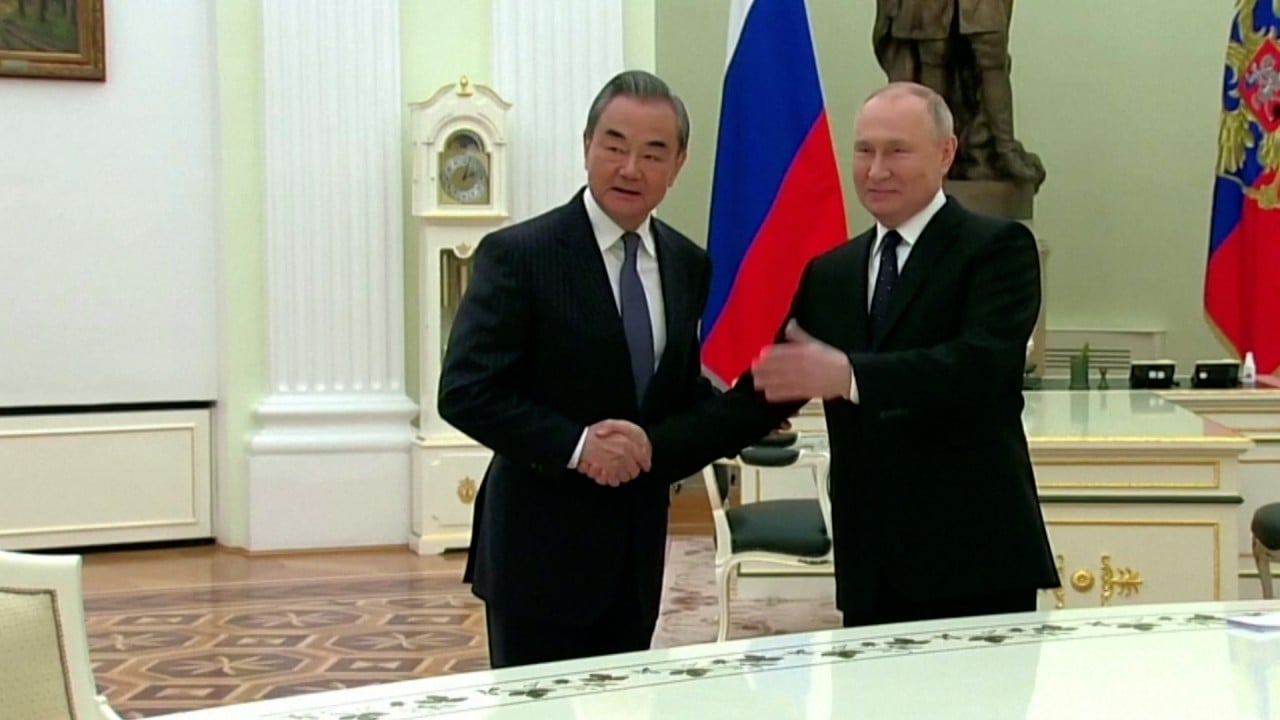
Joe Biden says Vladimir Putin has strengthened Nato’s alliance and resolve
- The US president tells Nato’s easternmost members that they ‘know better than anyone what’s at stake in this conflict’ in Ukraine
- Nato head Jens Stoltenberg adds in meeting that ‘we cannot allow Russia to continue to chip away at European security’
The two leaders made their remarks in Warsaw at a gathering of the Bucharest Nine, or “B9” – the North Atlantic Treaty Organization nations nearest to Russia – as they faced the prospect of a protracted war against Ukraine, with Stoltenberg emphasising the need to “break the cycle of Russian aggression”.
“I said you keep asking for the Finland-isation of Nato, you’re going to get the Nato-isation of Finland,” Biden said, referring to Putin.
“Well, it happened. Not only are we as strong as we were, we’re stronger.”
“As Nato’s eastern flank, you’re the front lines of our collective defence and you know better than anyone what’s at stake in this conflict, not just for Ukraine, but for the freedom of democracies throughout Europe and around the world,” Biden added, vowing to “defend literally every inch of Nato”.
Turkish President Recep Tayyip Erdogan announced this week that Ankara was ready to resume negotiations on Finland’s and Sweden’s entry into the defence alliance after suspending them last month. Erdogan had claimed that Finland was harbouring militants from the Kurdistan Workers Party, which Turkey considers a terrorist group.
Hungary, the only other Nato member to oppose Stockholm’s and Helsinki’s applications, could ratify their membership bids early next month, Hungarian media reported on Tuesday.
In addition to Poland and Hungary, B9 nations include the Baltic states of Estonia, Latvia and Lithuania; Romania, Bulgaria, Slovakia and the Czech Republic.
These developments, and US Secretary of State Antony Blinken’s participation in the Munich Security Conference in Germany, have pushed the divide between Washington and its allies on one side and China and Russia on the other further into what many analysts are calling a new phase of great-power competition.
Stoltenberg spoke in similar terms, warning that sustained support for Ukraine was necessary “to ensure that history does not repeat itself”.
“President Putin is not preparing for peace,” he said. “On the contrary, he is preparing for more war … We cannot allow Russia to continue to chip away at European security, we must break the cycle of Russian aggression.”

“Allies have never been more united,” Stoltenberg added. “We will protect every inch of allied territory based on our Article 5 commitment”, which authorises Nato to come to the defence of any member facing military attack.
Chris Miller, an associate professor of international history at Tufts University, agreed that the war in Ukraine has caused a historic East-West rift.
“The Russia-Ukraine war and China’s decision to side politically and economically with Moscow has divided the world’s major powers into two camps,” said Miller, the author of Chip War: The Fight for the World’s Most Critical Technology.
“The world faces a dangerous moment, as the security situations in Ukraine, Taiwan and the Persian Gulf are more interlinked than ever before,” he said.
Underscoring the increasing antagonism between Western countries and a China-Russia relationship that has remained strong throughout the Kremlin’s year-long war in Ukraine, Wang told Putin during his visit to Moscow that bilateral relations have “withstood pressure” and would not be swayed by any “third party”.
The Wang-Blinken meeting was marked by sharply differing positions over Biden’s decision to shoot down a Chinese surveillance balloon over US territory, an incident that has strained bilateral ties further.
Daniel Kritenbrink, assistant US secretary of state for East Asian and Pacific affairs, reiterated this point during a briefing in Washington on Wednesday.
“Unfortunately, in private, we’ve seen that China continues to aid Russia’s brutal war efforts against Ukraine and now it’s inching closer to potentially providing lethal aid,” Kritenbrink said.
“China’s words would be taken more seriously if it pulled back from the support to Russia that is directly at odds with the principles of sovereignty and territorial integrity,” he added.
Chinese Foreign Ministry spokesman Wang Wenbin called Blinken’s allegation “false information”, and noted that Washington has led efforts to supply Ukraine with weapons that have been used to fight the Russians.
Miller said that Beijing would only exacerbate the East-West rift if it were to provide Russia with weapons.
“If China were to begin supplying lethal aid to Russia, this decision would further turn Western opinion against Beijing,” he said, “and make it more difficult for China to use economic inducements to win friends in the West.”
Additional reporting by Orange Wang in Washington


